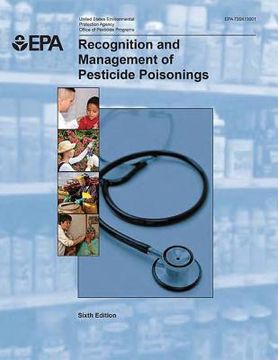Compartir
Recognition and Management of Pesticide Poisonings (en Inglés)
Agency, U. S. Environmental Protection (Autor)
·
Createspace Independent Publishing Platform
· Tapa Blanda
Recognition and Management of Pesticide Poisonings (en Inglés) - Agency, U. S. Environmental Protection
$ 38.25
$ 53.12
Ahorras: $ 14.88
Elige la lista en la que quieres agregar tu producto o crea una nueva lista
✓ Producto agregado correctamente a la lista de deseos.
Ir a Mis Listas
Origen: Estados Unidos
(Costos de importación incluídos en el precio)
Se enviará desde nuestra bodega entre el
Jueves 18 de Julio y el
Jueves 25 de Julio.
Lo recibirás en cualquier lugar de Internacional entre 1 y 3 días hábiles luego del envío.
Reseña del libro "Recognition and Management of Pesticide Poisonings (en Inglés)"
The purpose of this manual is to provide healthcare professionals with current consensus recommendations for treating patients with pesticide-related illnesses or injuries. The Office of Pesticide Programs of the U.S. Environmental Protection Agency has sponsored the series since 1973. The 5th edition of this manual was published in 1999; since then, much has changed with regard to the pesticide products on the market. Most indoor uses of organophosphates have been eliminated, and a combination of EPA risk mitigation actions has limited their use on food crops. Pyrethroids have largely replaced organophosphates for residential pest control. While this conversion is beneficial in that the risk to human health is lower with this relatively less acutely toxic class of pesticide, it introduces a new set of health issues for consideration. Many new pesticide products have been registered and are not necessarily widely known among health professionals. This 6th edition includes a chapter that explores potential association between low-level exposure to pesticides over time and chronic diseases. There is general agreement that prevention of pesticide poisoning remains a much surer path to safety and health than reliance on treatment. In addition to the inherent toxicity of pesticides, none of the medical procedures or drugs used in treating poisonings is risk free. In fact, many antidotes are toxic in their own right, and such apparently simple procedures as gastric intubation involve substantial risk. The clinician must weigh the hazards of various courses of action (including no treatment at all) against the risks of various interventions, such as gastric emptying, catharsis, administration of intravenous fluids or administration of an antidote, if available. Clinical management decisions have to be made promptly and, as often as not, on the basis of limited scientific and medical information. The complex circumstances of human poisonings rarely allow for precise comparisons of alternative management strategies. Therefore, it is important for the reader to keep in mind that the treatment recommendations in this book do not guarantee successful outcomes. They are merely consensus judgments of the best available clinical management options. Clinical toxicology is a dynamic field of medicine; new treatment methods are developed regularly, and the effectiveness of old as well as new modalities is subject to constant critical review.
- 0% (0)
- 0% (0)
- 0% (0)
- 0% (0)
- 0% (0)
Todos los libros de nuestro catálogo son Originales.
El libro está escrito en Inglés.
La encuadernación de esta edición es Tapa Blanda.
✓ Producto agregado correctamente al carro, Ir a Pagar.

